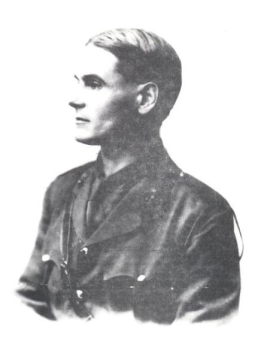Hodgson died in the trenches in 1918. This extract from one of his last letters, written early in 1918, is provided by Philip Ellis, and was part of an obituary in a magazine unknown to us.

"What a scene of desolation, the heaved-up mud rimming ten thousand shell craters as far as the sight could reach, north and south and east and west. My God, what a desolation! And here and there, standing like mute, muddied rocks — somehow terrible in their significant grim bashed formlessness — an old concrete blockhouse, with the earth torn up around them in monstrous craters, and, in some cases, surged in great waves of earth against the sides of the blockhouses. The sun was pretty low as I came back, and far off across that Desolation, here and there they showed — just formless, squarish, cornerless masses erected by man against the Infernal Storm that sweeps for ever, night and day, day and night, across that most atrocious Plain of Destruction. My God! talk about a lost World — talk about the END of the World; talk about the "Night Land" — it is all here, not more than two hundred odd miles from where you sit infinitely remote. And the infinite, monstrous, dreadful pathos of the things one sees — the great shell-hole with over thirty crosses sticking up in it; some just up out of the water — and the dead below them, submerged. And near the centre there was one cross inscribed to "Adolphe Dehaut, tué Nov. 26th, 1917." And on the centre of the cross, lashed with a piece of cross-wire, was an empty bottle, upside down. ("Turn down an empty glass," I suppose.) If I live and come somehow out of this (and certainly, please God, I shall and hope to) what a book I shall write if my old "ability" with the pen has not forsaken me. Who, I wonder, was Adolphe Dehaut? Some day, if it please God, I'll see that at least one French soldier's name is not lost in the dreadful oblivion that, like the mud of this hideous world, falls on the dead, and they pass out, wrapped in their blanket."

